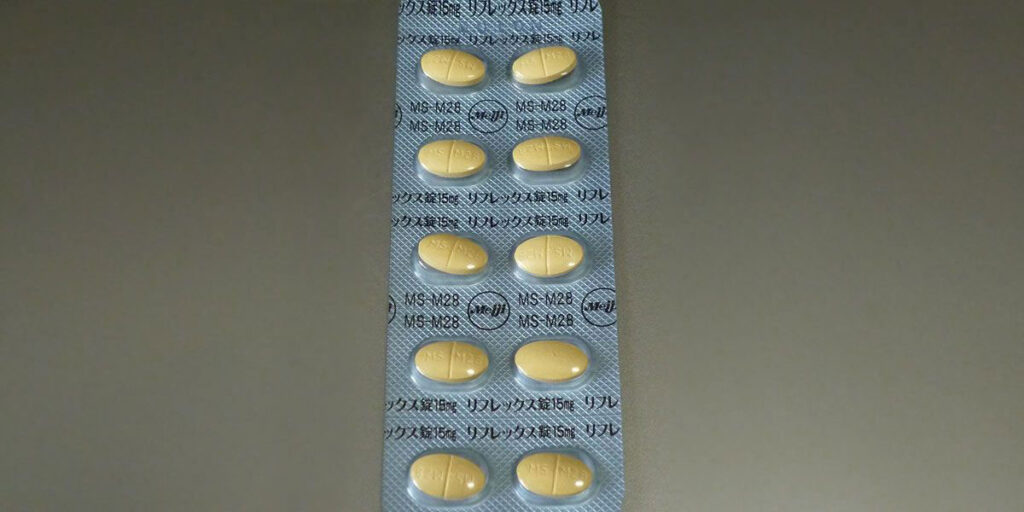Mirtazapine Addiction

Mirtazapine, also known as Remeron, is a medication used to treat depression with severe symptoms of insomnia and loss of appetite. Mirtazapine may cause sleepiness, decrease discomfort, and increase hunger. That’s why it can be suitable for various issues. However, this also suggests there’s a risk of using the drug more than needed or developing a dependence on it.
What is Mirtazapine (Remeron)?
The drug mirtazapine, recognized by the brand Remeron, is a unique medication sanctioned by the Food and Drug Administration (FDA). It assists in treating major depressive disorder in people who struggle with insomnia and have little appetite. Remeron operates in a multifaceted manner, impacting different regions of the brain.
Mirtazapine is part of a family of medicines known as tetracyclic antidepressants (teCAs). The first medicines like this, called tricyclic antidepressants (TCAs), came out in 1959 to help people with severe depression. When you take TCAs, they are distributed through your entire body, including your central nervous system.
Now, TCAs are used to help treat various health issues such as insomnia, post-traumatic stress disorder (PTSD), obsessive-compulsive disorder (OCD), migraines, and anxiety and panic disorders.
Mirtazapine Tablets
Mirtazapine comes in pill form. The big health group, the National Institutes of Health (NIH), says the first amount people should take is one 15 mg pill daily. If someone doesn’t start feeling better, they might be told to take up to 45 mg daily, which is the most you can take.
Remeron comes in two strengths: 15 mg and 30 mg. The 15 mg tablets are yellow, oval, and have “MSD” on one side and “T3Z” on the other. The tablets of 30 mg are oval and have a reddish-brown hue. One face is engraved with “MSD,” while the opposite bears the inscription “T5Z”.
Dissolvable Mirtazapine tablets known as Remeron SolTabs come in three dosages: 15 mg, 30 mg, and 45 mg. Each strength is round and white. The tablets of 15 mg are marked with “T1Z”, those of 30 mg bear the “T2Z” imprint, and the ones of 45 mg are labeled as “T4Z”.

Credit: Book74
CC0 1.0
Mirtazapine Side Effects
Mirtazapine can cause several unwanted side effects. The risk of overdose with Remeron is low, although it is slightly more dangerous than other antidepressants in overdose death cases. However, few deaths have been attributed to a mirtazapine overdose.
The common side effects of Remeron that might happen to more than 10% of people who take it include:
- Feeling sleepy
- Depression
- Weight gain
- Having thoughts of hurting yourself
- Dry mouth
- Higher levels of cholesterol
- Constipation
- Increased appetite
- Severe swelling of the pancreas
- Liver damage
- Physical dependence
Mirtazapine Drug Interactions
Mirtazapine can interact with a lot of other medications. When you take this antidepressant medication with another drug that makes you sleepy, it can make those sleepy effects much stronger.
Mirtazapine is in the class of medications called tricyclic antidepressants (TCAs), which should not be mixed with monoamine oxidase inhibitors (MAOIs), such as phenelzine. It is also not recommended to mix TCAs with selective serotonin reuptake inhibitors (SSRIs), like Lexapro, Prozac, or Zoloft, because of the risk of serotonin syndrome.
Be cautious when using mirtazapine with certain medications, as it can be dangerous. It is best to avoid mixing over-the-counter or prescription drugs to prevent any risks.
The medicines that could interact in ways we don’t want include:
- Tramadol
- Diazepam
- Cimetidine
- St. John’s wort
- Tryptophan
- Ketoconazole
- Migraine medications like zolmitriptan and sumatriptan
- Medications for mood disorders, encompassing lithium, various antidepressants, and antipsychotics
- Carbamazepine and phenytoin are medicines that doctors usually give to people who are unable to stop the drug
Remeron Withdrawal Symptoms
If you stop taking Remeron all at once or quit very quickly, you might get discontinuation syndrome. This is also called antidepressant discontinuation syndrome. It’s what happens when you suddenly stop using medicine for depression.
Around 1 in 5 people might get discontinuation syndrome if they suddenly stop taking a depression medication that they’ve been using for over a month. This means they start feeling specific symptoms 2 to 4 days after they stop the medicine. Usually, these feelings last about 1 to 2 weeks, but sometimes they can stick around for up to a year.
When you stop taking Remeron, you might feel:
- Depressed
- Upset
- Unable to sit still
- Anxiety
- Light-headed
- Trouble sleeping
- Feeling very worried or suddenly scared for no reason
- Loss of appetite
- Tinnitus or ringing or buzzing in your ears
- Nausea and vomiting

Mirtazapine Addiction Treatment at Northridge Addiction Treatment Center
If you or someone you care about is having a tough time with mirtazapine addiction or substance abuse, Northridge Addiction Treatment Center can help. NATC will support you in beating your addiction and dealing with any mental health issues so you can have a strong and healthy life focused on recovery.
At Northridge Addiction Treatment Center (NATC), our treatment programs and therapies are based on scientific research and evidence. We make a unique treatment plan for each resident so we can cater to your exact needs and goals. We’ll teach you skills and coping strategies to handle life without relying on drugs or alcohol.
Medical Detox
Northridge Addiction Treatment Center’s medical detox program in our residential treatment center lets you slowly stop using substances with doctors and nurses taking care of you. NATC makes sure that any intense withdrawal symptoms are taken care of safely and with the proper medical attention.
Cognitive Behavioral Therapy (CBT)
At NATC, we include a special kind of help called cognitive behavioral therapy, or CBT, in everyone’s personal treatment plan. We adjust it to help you stay sober for a long time and live a life of recovery. In CBT, our substance abuse and mental health experts teach you essential skills to deal with life challenges after treatment. These strategies will help you heal and move forward in recovery.
Contact us today. You can have a happy life without addiction. Our caring treatment experts are ready to help you get the support you need.
Find Meaningful Recovery
Our caring and compassionate specialists are eager to help you comfortably navigate this journey to recovery. Our individualized treatment plan, programs, and therapies may be a perfect match for you or your loved one. Let us assist you in living the happy life you deserve. It starts with a phone call.




